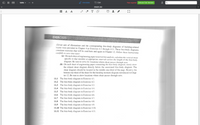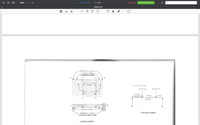
Structural Analysis
6th Edition
ISBN: 9781337630931
Author: KASSIMALI, Aslam.
Publisher: Cengage,
expand_more
expand_more
format_list_bulleted
Concept explainers
Question

Transcribed Image Text:130% v
- +
7 Annotate
T| Edit
Trial expired Unlock Full Version
ENGR 263
A A A
EXERCISES
Eleven sets of illustrations and the corresponding free-body diagrams of building-related
beams were provided in Chapter 4 as Exercises 4. I through 4.11. These free-body diagrams
constitute exercises that will be used here and again in Chapter 12. Follow these instructions
carefully to save time later:
(a) On each sheet of engineering paper reserved for analysis, calculate the vertical shear
specific to that member at appropriate intervals across the length of the free-body
diagram. Be sure to solve for locations where shear passes through zero.
(b) On cach sheet of engineering paper containing the tree-body diagram, neatly draw
the related shear diagram directly below the associated free-body diagram. The
shear diagram should be located in the middle one-third of the page. Reserve the
bottom one-third of the sheet for the bending moment diagram introduced in Chap-
ter 12. Be sure to show locations where shear passes through zero.
11.1 The free-body diagram in Exercise 4.1.
11.2 The free-body diagram in Exercise 4.2.
11.3 The free-body diagram in Exercise 4.3.
11.4 The free-body diagram in Exercise 4.4.
11.5 The free-body diagram in Exercise 4.5.
11.6 The free-body diagram in Exercise 4.6.
11.7 The free-body diagram in Exercise 4.7.
11.8 The free-body diagram in Exercise 4.8.
11.9 The free-body diagram in Exercise 4.9.
11.10 The free-body diagram in Exercise 4.10.
11.11 The free-body diagram in Exercise 4.11.

Transcribed Image Text:130% v
- +
7 Annotate
T| Edit
Trial expired Unlock Full Version
ENGR 263
A A A
Barna P S
(negligible weight)
A
Stetei izans
(loads) --
w = b/fe
2000 b
Fieen
6 Ft
1O FE
4 Fe
20 Ft
B
R.
SERei beam
Free-body diagram
Bearing Panes
(at column and in wall)
Loading condition
Expert Solution
This question has been solved!
Explore an expertly crafted, step-by-step solution for a thorough understanding of key concepts.
Step by stepSolved in 2 steps

Knowledge Booster
Learn more about
Need a deep-dive on the concept behind this application? Look no further. Learn more about this topic, civil-engineering and related others by exploring similar questions and additional content below.Similar questions
Recommended textbooks for you

 Structural Analysis (10th Edition)Civil EngineeringISBN:9780134610672Author:Russell C. HibbelerPublisher:PEARSON
Structural Analysis (10th Edition)Civil EngineeringISBN:9780134610672Author:Russell C. HibbelerPublisher:PEARSON Principles of Foundation Engineering (MindTap Cou...Civil EngineeringISBN:9781337705028Author:Braja M. Das, Nagaratnam SivakuganPublisher:Cengage Learning
Principles of Foundation Engineering (MindTap Cou...Civil EngineeringISBN:9781337705028Author:Braja M. Das, Nagaratnam SivakuganPublisher:Cengage Learning Fundamentals of Structural AnalysisCivil EngineeringISBN:9780073398006Author:Kenneth M. Leet Emeritus, Chia-Ming Uang, Joel LanningPublisher:McGraw-Hill Education
Fundamentals of Structural AnalysisCivil EngineeringISBN:9780073398006Author:Kenneth M. Leet Emeritus, Chia-Ming Uang, Joel LanningPublisher:McGraw-Hill Education
 Traffic and Highway EngineeringCivil EngineeringISBN:9781305156241Author:Garber, Nicholas J.Publisher:Cengage Learning
Traffic and Highway EngineeringCivil EngineeringISBN:9781305156241Author:Garber, Nicholas J.Publisher:Cengage Learning


Structural Analysis (10th Edition)
Civil Engineering
ISBN:9780134610672
Author:Russell C. Hibbeler
Publisher:PEARSON

Principles of Foundation Engineering (MindTap Cou...
Civil Engineering
ISBN:9781337705028
Author:Braja M. Das, Nagaratnam Sivakugan
Publisher:Cengage Learning

Fundamentals of Structural Analysis
Civil Engineering
ISBN:9780073398006
Author:Kenneth M. Leet Emeritus, Chia-Ming Uang, Joel Lanning
Publisher:McGraw-Hill Education


Traffic and Highway Engineering
Civil Engineering
ISBN:9781305156241
Author:Garber, Nicholas J.
Publisher:Cengage Learning